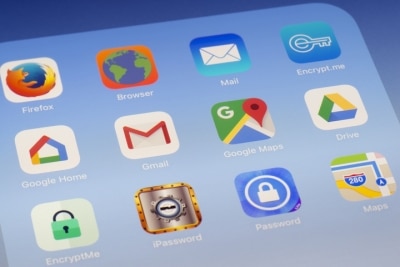You’ve Got Mail, Libra: Why Astrology in Email Marketing Is on the Ascendant
August 18, 2020
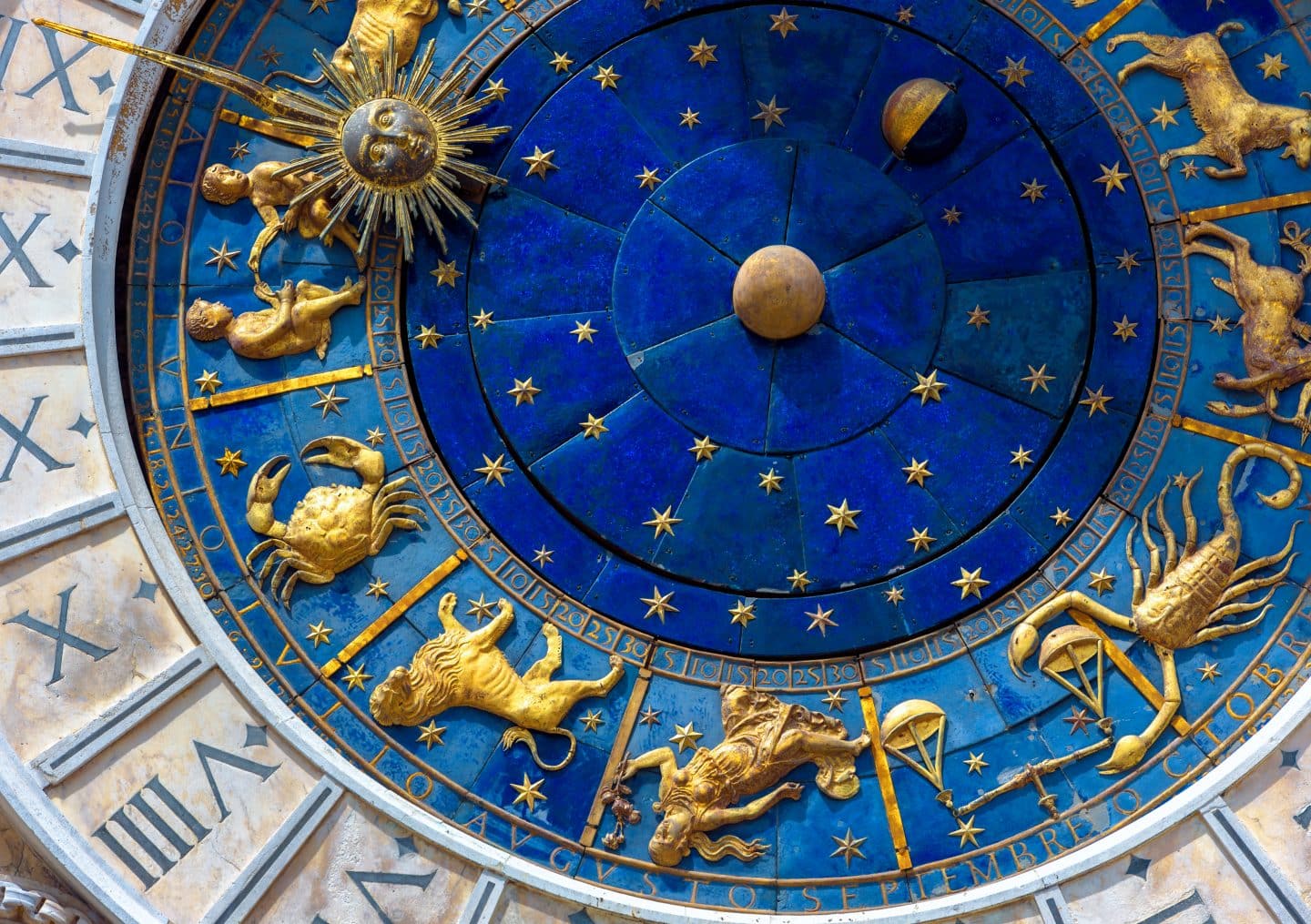
Days after Princess Margaret’s birth in August 1930, the Sunday Express newspaper consulted a celebrated palm reader to do her star chart. He wasn’t available, so his assistant, an astrologer named R.H. Naylor, filled in. Consulting the planets’ position during the exact moment the princess was born, Naylor predicted “events of tremendous importance to the Royal Family and the nation will come about near her seventh year.” (In 1936, her father, King George VI, became King of England.)
The public ate it up. Sunday Express tapped Naylor for more forecasts, and eventually his own column, popularizing horoscopes as we know them. Nearly a century later, the media landscape has changed dramatically and “astrology in email” is the new “astrology in the back of the newspaper.” Publishers like Refinery29 and Cosmopolitan email readers horoscope-themed newsletters. Retailers are increasingly engaging consumers by using astrology in email marketing as well. Why?
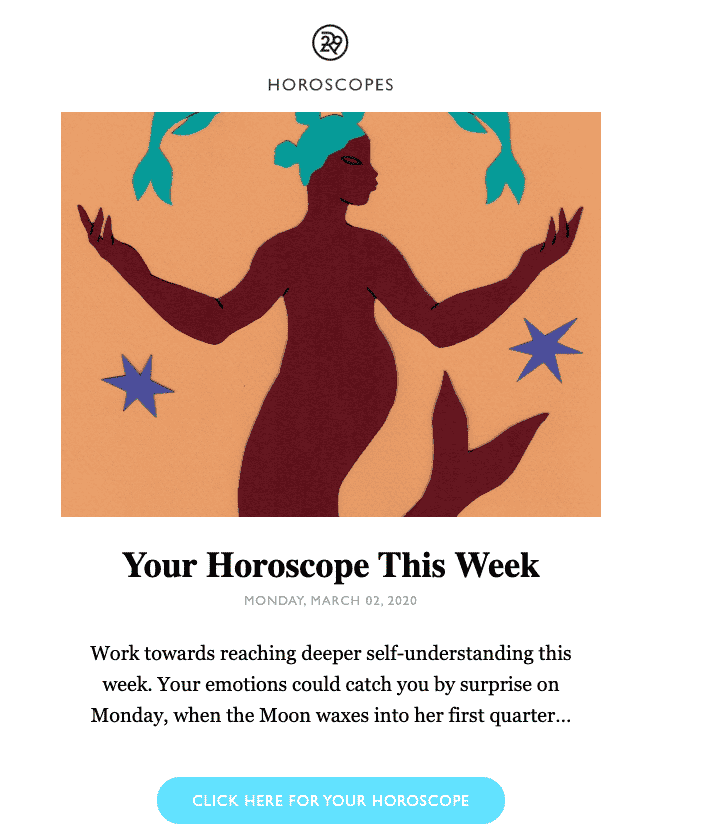
Astrology Is on the Ascendant
For one, astrology is undeniably having a moment in the sun. Google searches for “birth chart” have steadily increased over the past five years, while celebrated astrologer Susan Miller has 11 million website views each year. Another astrologer, Chani Nicholas, curates monthly Spotify playlists for each sign of the zodiac. Cosmic Playlists won a Webby Award last year with follower counts ranging from 72,000 (workaholic Capricorn) to 98,000 (moody Scorpio).
What’s more, astrology is popular enough that venture capitalists are investing. With more than 5 million users and a near-perfect average review in the iOS App Store, Co-Star, an AI-driven app that generates users’ star charts, has raised more than $6 million in funding.
Of course, where consumers are, brands are sure to follow. Type “zodiac” on Alex and Ani’s website and you’ll find 88 different charms. The same search on Etsy brings up 250 pages of jewelry, art, mugs, crystals, clothes and more.
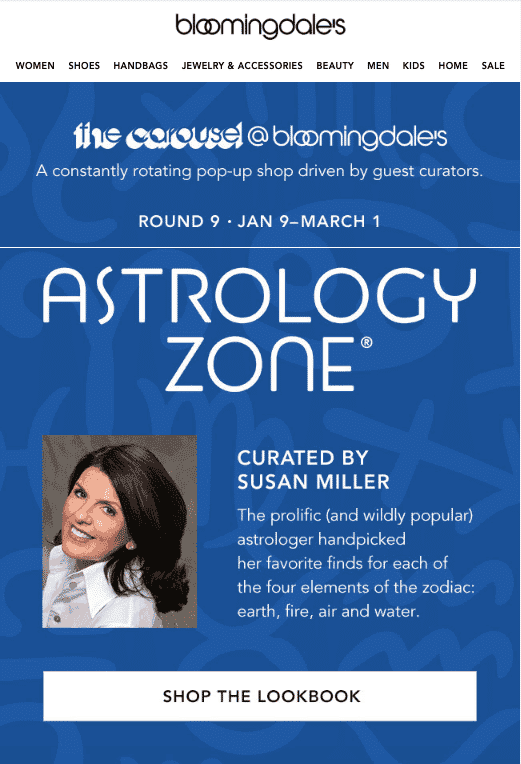
With so many zodiac products, retailers are also incorporating astrology into their recommendations strategies. Earlier this year, Susan Miller took her Astrology Zone to Bloomingdale’s. She launched a pop-up boutique, picking four sets of products, for customers born under each of the zodiac’s four elements.
thredUP took that a step further, recommending the perfect brand for each sign. For example, astrologers associate orderliness and perfectionism with Virgo, which translates to “smart, conservative, classic” looks from J. Crew. Meanwhile, a versatile Gemini, who “switches up her style, just like that,” is more suited for Urban Outfitters.
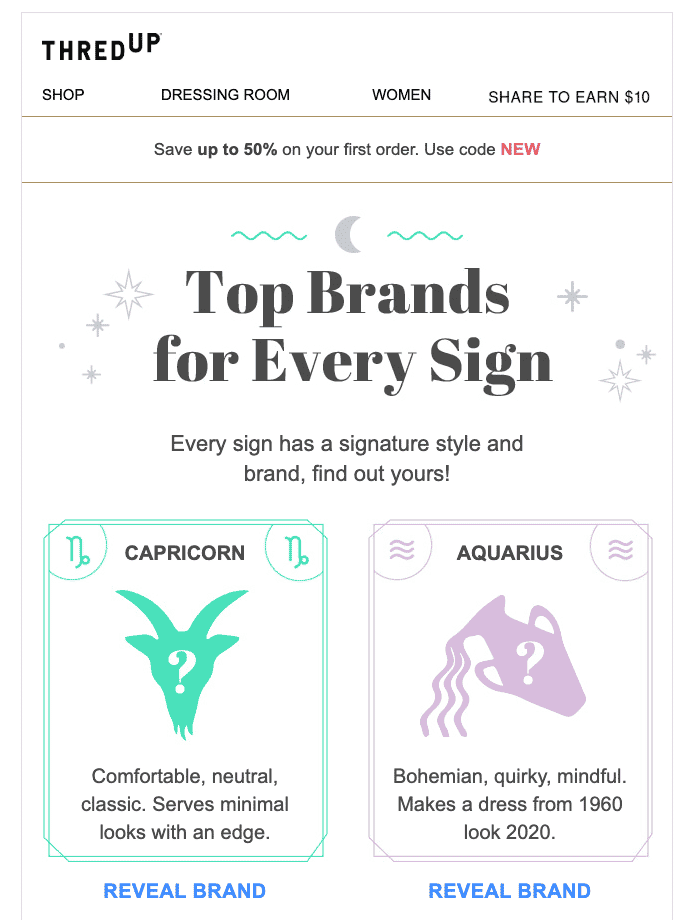
Astrology in Email: Segmentation and What Feels Like Personalization
Thinking about astrology in email marketing, there’s the “why” (it’s popular) but also the “who.” To successfully engage with consumers, marketers need to understand consumers. Not just their demographics and purchase history, but the psychographics — a classification of people based on psychological attributes such as attitudes and aspirations — behind those purchases.
Vince Mitchell, a professor of marketing at the University of Sydney, believes psychographics are especially powerful when paired with demographic data, something that’s easy to collect and measure, but still provides insight into consumers’ lifestyle. In other words, zodiac signs.
Mitchell wrote a research paper on zodiac signs and segmentation, concluding that astrology “may have some use when applied to certain populations or sub-groups within certain lifestyle and personality-related markets.” Like a true trailblazing Aries, Mitchell conducted this research in 1995, well before email, let alone astrology in email, hit critical mass.
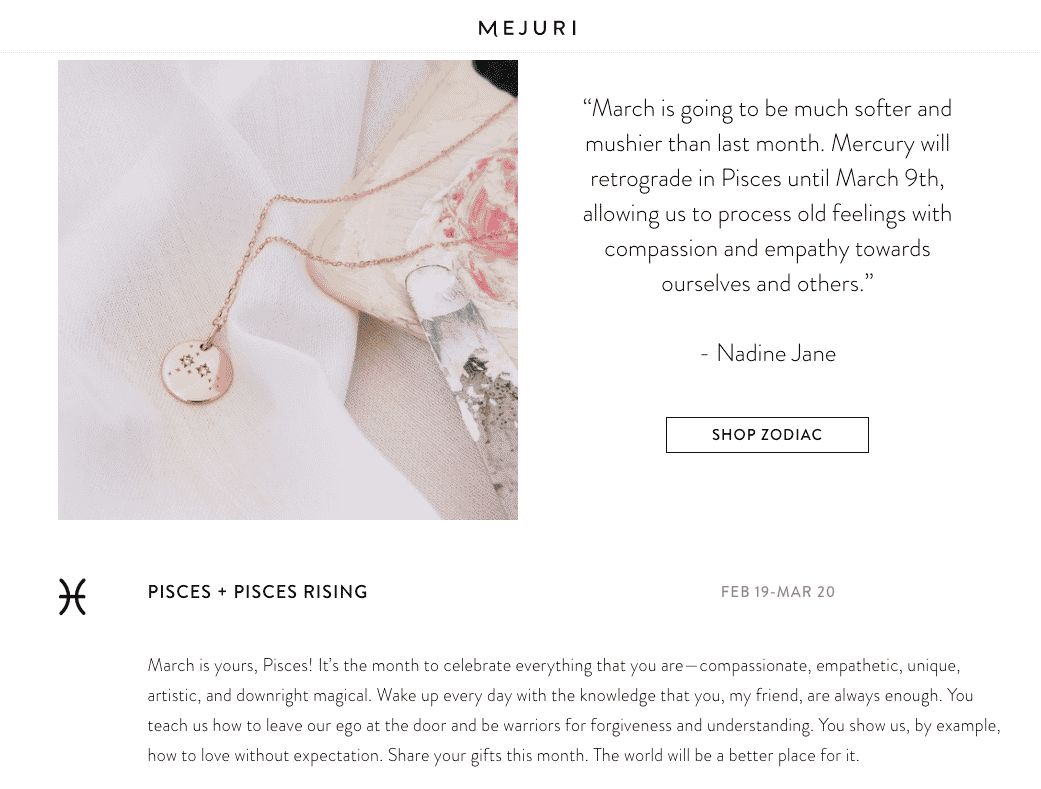
As many email marketers know, segmentation and personalization are often conflated. They’re not the same. However, if the former is strong enough, it can seem like the latter.
This is especially true as retailers work astrology in email marketing: recommendations, zodiac-themed gift guides, birthday month discounts. Another retailer with an astrologer collaboration, Mejuri sends customers monthly horoscopes alongside complementary jewelry for each sign. Fashion Nova also uses the zodiac as a prompt for push notifications.
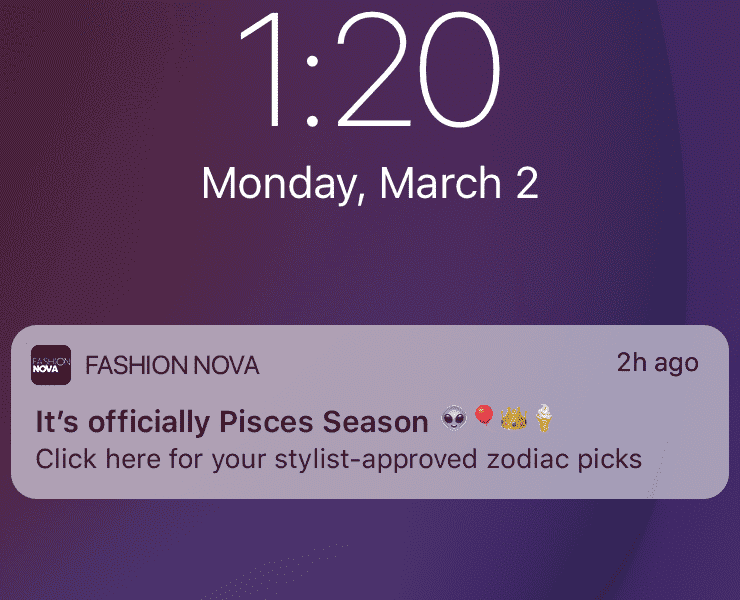
Wrapping Up
Our inboxes are fuller than ever and that isn’t changing any time soon. In its annual Email Statistics Report, the Radicati Group estimates that each year, the number of emails we send and receive will continue to grow by about 4.3%. This means we’ll send and receive more than 347 billion business and consumer emails daily by 2023.
People are more likely to open emails with personalized subject lines and more likely to shop with brands that make personalized recommendations. Astrology in email newsletters makes perfect sense. Beyond its popularity, zodiac signs are a perfect example of contextual marketing that, at first glance, look like personalization. Also known as “those who bought this also bought that,” collaborative filtering is another example of this.
Collaborative filtering was popularized by Amazon, a company that owes 35% of its sales to its recommendation engine. Last spring, Amazon surpassed Walmart as the world’s largest retailer, so that 35% represents billions and billions of dollars. Naturally, Jeff Bezos is a Capricorn, the sign most associated with ambition and determination.
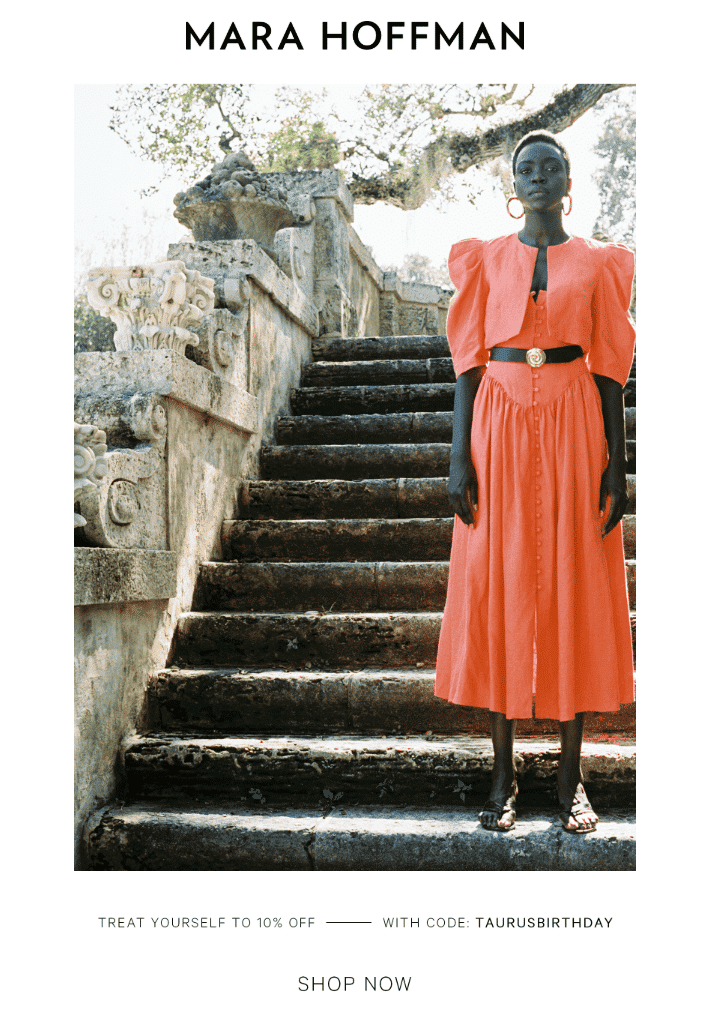
For additional marketing services and industry trends, subscribe to our award-winning blog today!
The State of Brand Loyalty in the U.S. in 2023
Related



